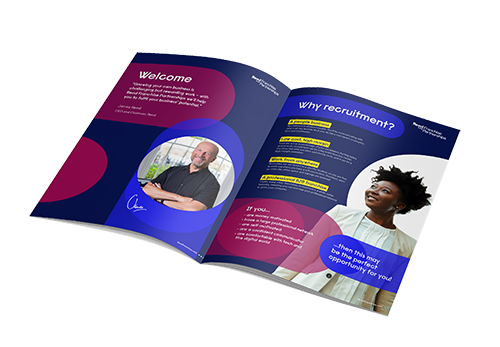ARTICLE
A non-trainer’s guide to recruitment training
There are many benefits to running your own recruitment business and hiring your own team – but what can you do to make sure you are successful?
Self-employment offers a chance to take control of your career and financial future, but can be a big step. This article offers food for thought to ensure you are making the right move into your own recruitment business.
Self-employment is often looked upon as the ultimate professional goal – a chance to follow a passion, be your own boss and make your own rules. It shows an adventurous spirit and requires grit and determination to make a success. It can also be a huge culture shock for those used to working for an employer, meaning not every dream is realised once reality bites.
To help you decide if self-employment is really for you, this article helps you to put the decision into perspective and consider the tough questions about your motivation, goals and suitability before taking action.

There are two reasons why someone might consider starting their own business:


What kind of business do you want? It may sound odd, but before you start you need to consider where you want to end. What’s your end goal or exit strategy?
Do you want to grow a business of scale which you could sell? If so, do you understand the journey needed to achieve it, and what kind of sale do you have in mind? Have you researched how many such successful exits there are in your market?
Do you want growth to mean more headcount? How important is it to maintain a decent work-life balance? Do you hope to one day sell the company? If so, what will you need to achieve to reach this goal?
Alternatively, do you want to be a solopreneur and/or have a lifestyle business? The key thing is to have some sort of end goal in mind as you set out.
It’s also important to define your offer and decide your market. What roles will you recruit and in which industries and geographic regions? Who are your target clients? What services will you offer/ how relevant are they to your clients’ needs? How will you attract candidates? How passionate are you about your market?
Do you have the personal qualities required for self-employment – are you sufficiently self-motivated and resilient? Can you prosper outside of your corporate environment? Be honest with yourself – get feedback from your friends and family.
In a similar vein, assess your strengths and weaknesses. If you are not a great organiser and hate administration, how are you going to manage the financial and regulatory formalities and filings you have to do as a business owner? If you love the candidate side and recruitment process side of the business, but are a little weaker on business development – how are you going to win new business when you launch?
Do you have a support network in place? That might be friends and family who can help and understand when things are tough, or a group of fellow entrepreneurs who you can turn to for help and advice, online or in person.
Also consider the implications of any restrictive covenants you have with your current employer and the effect they may have on you launching your business and conducting business development.

It can be very hard to switch off. There can be a constant ticking in your mind about deals, bank balances, and employees.
It can also be lonely. Your family may be supportive, but they may not really know how your business works. It can be hard to find that shoulder to cry on when things go wrong, and more importantly, you may just be missing that person with whom you can bounce off ideas.
Many books on entrepreneurialism are simple tales of guts and glory. A recommended read is ‘The e-myth revisited: why most small businesses don’t work and what to do about it’, by Michael E Gerber, which gives a good insight into the trials and tribulations of self-employment.
Find your own way to unwind. A first step is telling yourself it is okay to take time off – find something that absorbs your attention and allows you to switch off from work.
Know when and where to seek help. Use your network, join local business groups. At Reed Franchise Partnerships, we are passionate about building a community of like-minded recruitment business owners with whom our partners can share ideas, problems and celebrate successes. We see this as providing a great halfway house between the corporate world and the potential loneliness of self-employment.
Work hard, have a growth mindset, sharpen your skills and deploy your knowledge and you have every chance of success. As such, the financial rewards, freedom and pure satisfaction should far outweigh the cons.

Self-employment can be a great option for those who want more control over their work, are comfortable with risk and uncertainty, and have an entrepreneurial mindset. It can also offer greater flexibility and the ability to work on projects that are more personally fulfilling.
On the flip side, it also comes with challenges, such as the need to manage all aspects of the business, including finances, marketing, and customer acquisition. It can also be difficult to generate a steady income and to balance work and personal life.
Ultimately, whether self-employment is right for someone depends on their individual circumstances, goals, and personality. Seek advice from experienced entrepreneurs or business coaches and make sure it is something you are willing to commit to for the long haul.
Want to be your own boss? If you’re a recruitment professional looking for your next step, find out how Reed Franchise Partnerships can help you set up your own business.
Start your company with Reed Franchise Partnerships and take advantage of our simple and proven path to build and run your own business and receive over $35,000 of direct and indirect investment from us and tangible benefits from day one. Would you like to see more?
Request a demo
There are many benefits to running your own recruitment business and hiring your own team – but what can you do to make sure you are successful?

If you’re an experienced recruiter looking to open your own business, a recruitment agency looking to flourish with the backing of a global brand, or an entrepreneur looking to open a staffing business, we have the tools to help you.

Unlock the full potential of your business venture by downloading the Reed Franchise Partnerships manual.